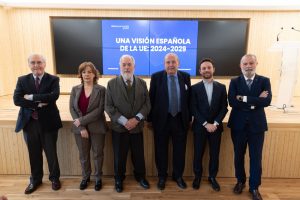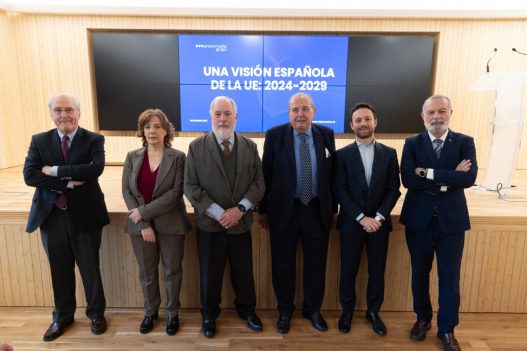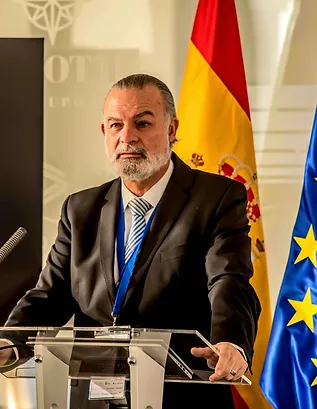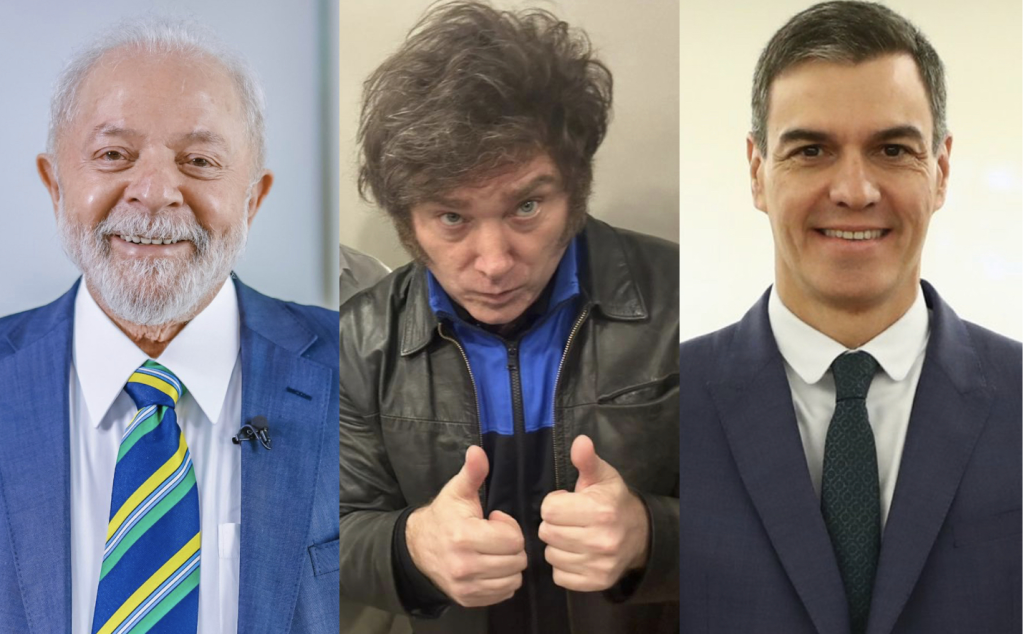
THE 'SPANISH VISION OF THE EU' INCLUDES A CRITICAL READING OF THE UNION'S ENLARGEMENT
Prestomedia has presented this Monday, November 27, 2023, the study ‘A Spanish vision of the EU: 2024-2029’. It is a report directed by former ambassador Javier Elorza, which addresses the immediate and medium-term future of the European Union from the Spanish perspective. Leading experts, such as Francisco Fonseca, Miguel Arias Cañete and María Luisa Humanes, have contributed to this multidisciplinary analysis that seeks to strengthen Spain’s position in the face of the strategic challenges of the new European legislature.
The Ortega Marañón Foundation in Madrid hosted the presentation of the study on Monday. The full text is presented as a valuable contribution to the European debate, underlining the importance of Spain’s maturity as a Member State over the last four decades. The multidisciplinary writing team addresses technical aspects, major issues and prospects in three parts.
Yago González, CEO of Prestomedia, explained that with the firm determination to contribute to the development of ideas to make “more and better Europe”, Prestomedia launched “Objective Europe”, a think tank with the participation of experts with knowledge of the European reality, covering various ages and political visions; established to generate actions that strengthen the European project and advise the Group’s media.
Within the framework of the upcoming European elections, the need was identified to prepare a study which would include: the Spanish vision of the future of Europe, how Spain can move its assets to carry out the enlargement of the European Union and the necessary reform of the treaties to make these incorporations possible.
Jesús González, director of Canal Europa and Aquí Europa, pointed out that this is a study that does not speak of Spanish priorities, “that does not say what we need from the European Union but rather speaks of a Spanish vision; I believe that after 40 years we have the right to speak of a Spanish vision”.
The study has three parts. The first is devoted to the key policies of constitutional governance. The second part deals, through contributions from experts, with the major issues of institutional governance, energy governance and economic governance: energy and the European green pact, territorial and social cohesion, digitalization, geopolitics, security and defense, values, rights and democracy, global health and tourism. And a third part on foresight. Closing with an executive summary.
The study, directed by former ambassador Javier Elorza, seeks to contribute to what should be the Spanish position before the strategic objectives that arise in the new legislature and to transfer these ideas to the Institutions. Elorza has recognized that “it is not an easy task to contemplate the future and to guess how it will be a game with many players and many interests”.
For his part, Miguel Arias Cañete, former Commissioner of the European Commission, emphasized the difficulty of the coming years and the need to have clear objectives. In this sense, he highlighted the “pragmatic and courageous” analysis of Ambassador Elorza, “someone who is used to facing great challenges and working tirelessly to overcome them”. The former Commissioner stressed the importance of a recurring objective in the study: to ensure that Spain has the possibility of a blocking minority in the European Union. Emphasizing that this challenge would guarantee a strong position for Spain, allowing it to influence major enlargement events and future EU policies.
The Vice-President of the Council of Europe, Antonio Gutiérrez Limones, also participated in the presentation, pointing out that in the current world scenario “violent, complex and full of uncertainties, if the European Union wants to play the role of a global player in the coming years, its best letter of introduction cannot be other than those shared values of democracy, the rule of law and human rights”. He highlighted Spain’s contribution to the European Union since its accession, assuring that it has benefited Europe but also Spain. In this sense, he affirmed that “we are obliged to lead the reform process that will be carried out in the coming years in the European Union and at the same time we are also obliged to do so accompanied by the voice and also the position of the Ibero-American community, because it is the most Euro-compatible region in the world”.
This Report analyzes the process of reflection on the future of Europe that has taken place in recent years and includes the conditions that we consider important for Spain and which must necessarily be met in order to reform the Treaties, always in favor of greater integration and more Europe and, at the same time and without collision with the defense of Spanish interests.
This news was originally published in Aquí Europa.



